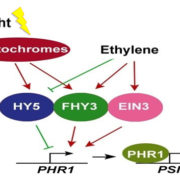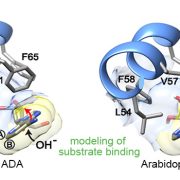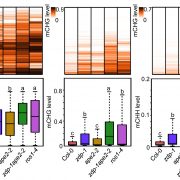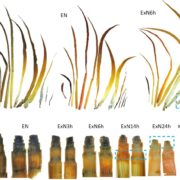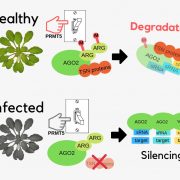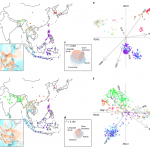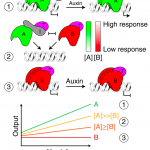Plant synthetic promoters to fine tune expression of engineered genes (bioRxiv)
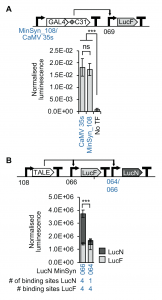 Synthetic genetic circuits allow the reconstruction of metabolic pathways in plant systems for production of many natural products including pharmaceuticals. A challenge in genetic engineering these circuits is precisely and predictably regulating gene expression, especially when genes may be desired in different ratios for optimal throughput. This research into minimal synthetic promoters (MinSyns) by Cai et al. identifies functional cis-regulatory elements that they combined to design a suite of MinSyns. Initial analysis enabled computer-guided generation of MinSyns of varying strength that are bound by endogenous transcription factors. They focused on three MinSyn systems that express in most leaf and root tissue with varying strength of which the strongest, #108, induces similar expression levels to CaMV 35S promoter. A MinSyn was used to drive expression of a synthetic transcription factor (TALE) that targets specific MinSyns co-introduced for the genes of interest. By altering the number of TALE binding sites in the reporter gene MinSyn promoters, they were able to adjust the ratio of the two proteins in the circuit. This work has exciting applications in biotechnology to improve natural product biosynthesis by optimizing enzyme ratios under the control of the same synthetic transcription factor. (Summary by Katy Dunning @plantmomkaty) bioRxiv
Synthetic genetic circuits allow the reconstruction of metabolic pathways in plant systems for production of many natural products including pharmaceuticals. A challenge in genetic engineering these circuits is precisely and predictably regulating gene expression, especially when genes may be desired in different ratios for optimal throughput. This research into minimal synthetic promoters (MinSyns) by Cai et al. identifies functional cis-regulatory elements that they combined to design a suite of MinSyns. Initial analysis enabled computer-guided generation of MinSyns of varying strength that are bound by endogenous transcription factors. They focused on three MinSyn systems that express in most leaf and root tissue with varying strength of which the strongest, #108, induces similar expression levels to CaMV 35S promoter. A MinSyn was used to drive expression of a synthetic transcription factor (TALE) that targets specific MinSyns co-introduced for the genes of interest. By altering the number of TALE binding sites in the reporter gene MinSyn promoters, they were able to adjust the ratio of the two proteins in the circuit. This work has exciting applications in biotechnology to improve natural product biosynthesis by optimizing enzyme ratios under the control of the same synthetic transcription factor. (Summary by Katy Dunning @plantmomkaty) bioRxiv
[altmetric doi=”10.1101/2020.05.14.095406″ details=”right” float=”right”]


